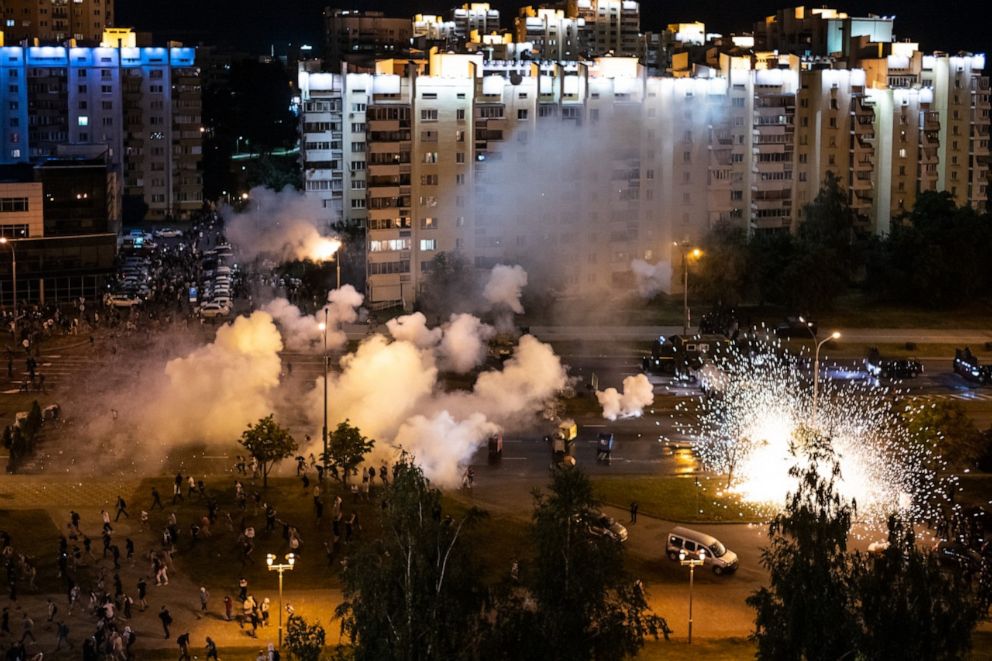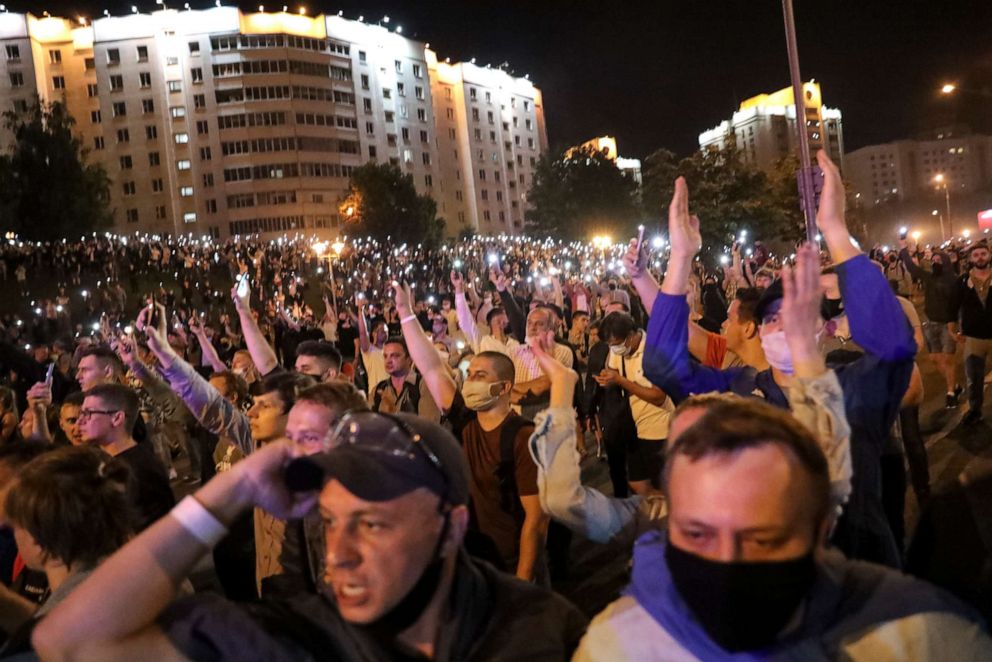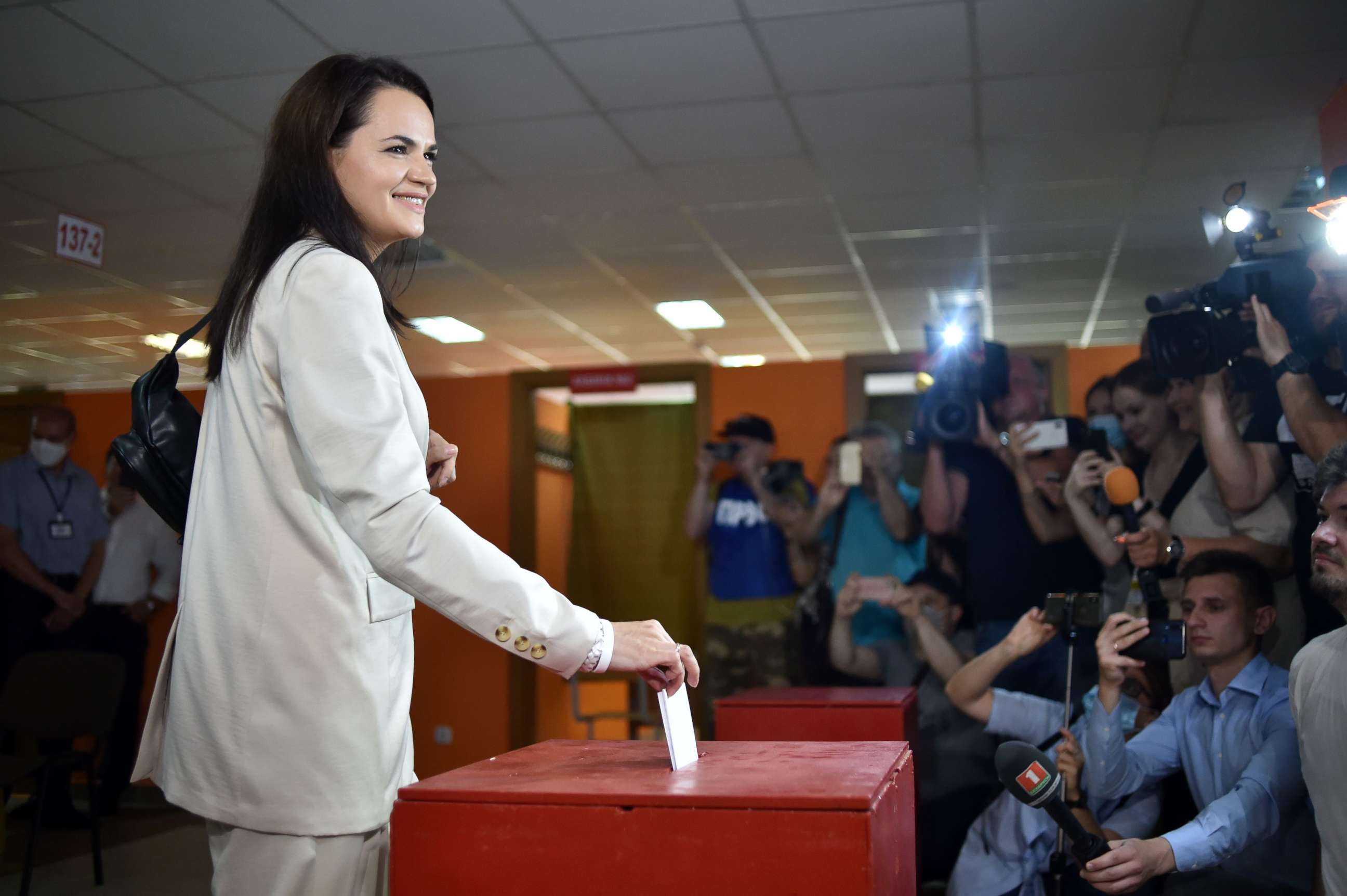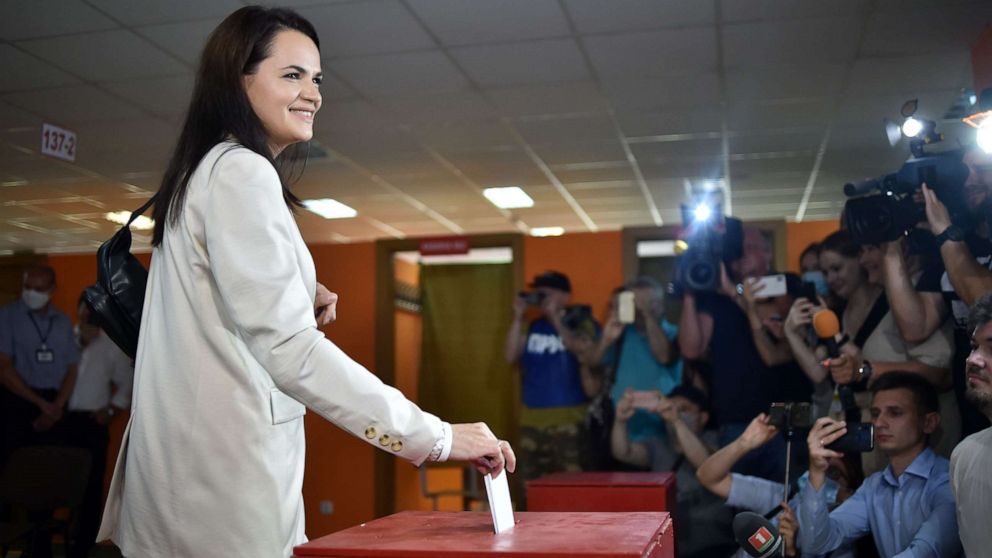Belarus opposition rejects election results amid calls for more protests
Belarus’ main opposition candidate has rejected the official result of the presidential election that handed a landslide victory to the country’s authoritarian leader Alexander Lukashenko on Sunday, hours after security forces violently crackdown on protests who had challenge the result.
There were chaotic scenes in Belarus’ capital Minsk Sunday night, as hundreds of riot police and interior ministry troops used armored vehicles, stun grenades and rubber bullets against thousands of demonstrators protesting the election.
Dozens of protesters were injured, at least one seriously, while authorities said around 3,000 people were detained.
Svetlana Tikhanovskaya, the key opposition challenger to Lukashenko, told a press conference Monday morning that the vote had seen massive fabrication and that she was the winner of the election.
“We don’t recognize the results of the election. We have seen the real ballot results. We call on those who believe that their vote has been stolen not to keep silent,” Tikhanovskaya said.

She called on authorities now to hold negotiations for the peaceful transfer of power and her campaign said they would seek to use all legal means to have the result reassessed.
“The government aren't listening to us, it has completely broken with the people, but I should repeat that we are for peaceful transitions and the government ought to think about now how to handover power through peaceful means, because at the moment they only have one way -- violence against their own people,” Tikhanovskaya said according to the local Belarus’ news outlet, Tut.by
Tikhanovskaya stopped short of calling explicitly for more protests, but other opposition social media channels urged people to join a new demonstration on Monday evening in Minsk.
In the posts, people were urged to buy helmets and other protective gear from building supplies stores, as well as first aid equipment, in anticipation of fresh violence from the police.
The posts also called for a national strike to begin on Tuesday with the demand that fresh elections be held without Lukashenko.
Belarus’ central elections commission on Monday said preliminary results showed Lukashenko received a huge 80.24% of the vote, with Tikhanovskaya receiving just 9%.
Tikhanovskaya has become the head of a swelling protest movement in Belarus that, before the election, attracted the biggest political demonstrations in the country since the fall of the Soviet Union.
The protests has meant the election this year is seen as the biggest challenge Lukashenko-- often referred to as 'Europe's Last Dictator"-- has faced in his 26 year-rule.

Tikhanovskaya’s supporters, as well as most outside observers, believe the election saw widespread ballot rigging.
Tikhanovskaya’s campaign has claimed ballots checked at polling stations in Minsk show her winning in reality by five to six times against Lukashenko. They also pointed to a record number of early votes -- 40% of voters -- as suggesting there had been massive falsification.
Lukashenko on Monday immediately dismissed the idea of any negotiations with the opposition and was unapologetic about the crackdown on demonstrators.
“I warned there won’t be a Maidan, no matter who wanted it,” Lukashenko said, according to Belarus' state news agency, referring to Ukraine’s popular revolution in 2014 that toppled an autocratic president. “And so it has to be quietened down, to be calmed down. The response will be adequate. We will not allow them to blow up the country.”
Lukashenko accused demonstrators of deliberately provoking police and accused several European countries of directing the opposition. He said the election on Sunday had meant to be a “holiday”.
“You understand, it’s a holiday. And somebody wanted to spoil this holiday. We saw them -- they showed themselves ever brighter this night. From Poland, Britain, the Czech Republic, there were calls, directing our, forgive me, our sheep,” Lukashenko said.
The European Union expressed concerns about the situation in Belarus. The European Council’s president Charles Michel wrote on Twitter calling on Belarus’ authorities to respect freedom of assembly and “basic human rights”. Poland’s prime minister Mateusz Morawiecki called for an emergency EU summit to be held on the situation.
Lukashenko’s re-election was quickly recognized by China and by Belarus’ key ally Russia. President Vladimir Putin was among the first to send a message to Lukashenko congratulating him on his victory. Relations between the Kremlin and Lukashenko have been strained recently, as the Belarusian leader has turned more towards Western countries as a counter balance to a more overbearing Russia.
Lukashenko had improved relations with Europe and in particular the United States after being a pariah for years following another crackdown after a presidential election in 2010. The U.S. restored diplomatic relations with Belarus last year and an American ambassador was due to arrive soon in Minsk for the first time in a decade.
The new crackdown and allegations of a stolen election could now pose a challenge to that rapprochement.

Some analysts had thought the Kremlin might remain distant from Lukashenko during any political crisis, frustrated by his recent refusal to accept greater integration with Russia.
Putin’s swift congratulations, however, suggested Moscow has no interest in seeing him pushed from power by protests, although Putin’s message also emphasized the Russian president's hope that Lukashenko would now facilitate greater integration in “all spheres” between the two countries.
Lukashenko cracked down harshly on opposition protests following an election in 2010, jailing key opponents and violently dispersing street protests. Observers though have said the scale of popular dissent this year is significantly larger than then.
Tikhanovskaya, who spent election day an undisclosed location over fears she might be arrested, has stopped short of calling for fresh demonstrations yet and it was unclear whether she would join those planned on Monday.
The internet in Belarus, which was partly shutdown on Sunday, was still greatly slowed down on Monday making communications difficult.
Another of her allies, Veronika Tsepkalo on Sunday left to Moscow where her husband, another opposition leader, Valery Tsepkalo was already in self-exile with their children. She has said she would return to Belarus.




